RSS
Jewish artists in Canada turned inward during 2024—and discovered bolder identities to share for 2025
Lelala Hewak has been taking portrait photos of hundreds, if not thousands, of Jews worldwide for a project called The J-Word, which is all about challenging assumptions about appearance.
“What we like to do, where we live, how we like to live, how we like to dress, how we like to worship—everything about us is different,” she said.
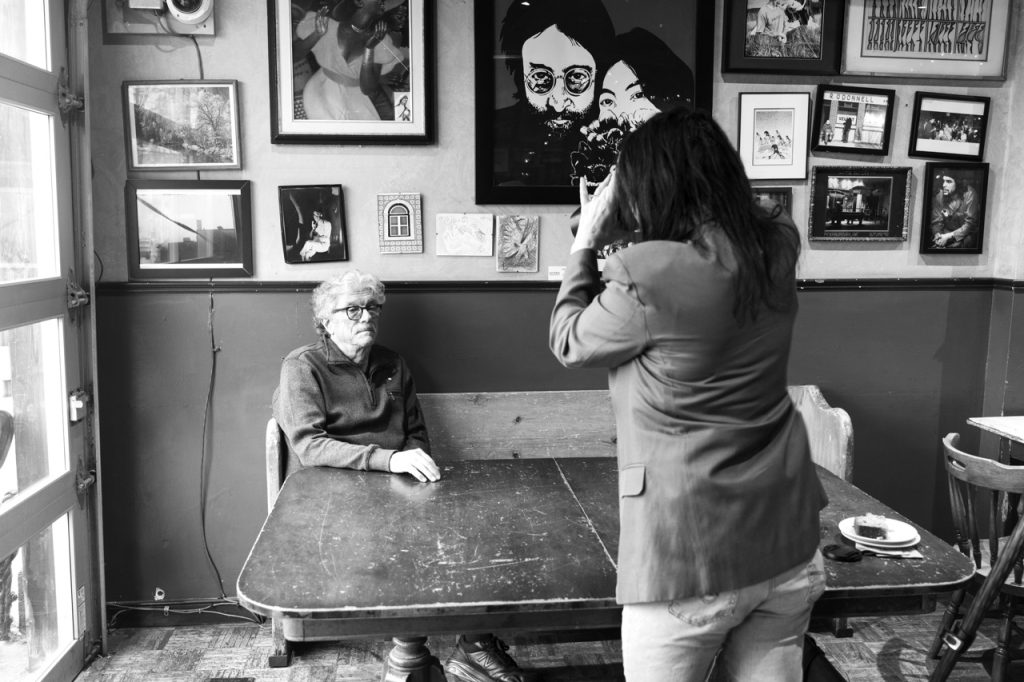
“It bothers me that people dare to make damaging generalizations, let alone slurs or attacks, and they don’t even know anything.”
She’s conscious that putting the spotlight on Jewish faces, right now, may “raise eyebrows” or encounter pushback, she says, but Hewak points to rising antisemitism as an issue on a worldwide scale.
“There’s plenty of people working on humanitarian and other political issues to do with how things are being handled by Israel in the Middle East. It’s not my area of expertise. Why would I dare go there?… Doesn’t mean I should be silent on this other problem.”
Hewak recently visited New York to take the portraits of freestyle rapper Kosha Dillz, and Rabbi Manis Friedman of Chabad Lubavitch—both of whom are familiar figures on social media. Her goal is not proving multiethnic Jews exist, she says.
“I’m not trying to say ‘Oh, look, we have different colour skin’,” but rather, that a Jew might wear, for example, anything from construction work clothes to the black suits of some religiously observant Jews.
Hewak’s playful, provocative art is one approach among many within Jewish creative circles, where artists have now contended for more than a year with a cultural world that often defaults toward overwhelming anti-Israel sentiment, and frequently poses litmus tests around it. Even artists who have refrained from commenting on the political situation post-Oct. 7 can find themselves under attack or cancelled.
Jewish arts events now tend to involve extra calculations about security for venues, audiences, and artists, causing artists to grapple with how much or in what capacity to identify Jewishly in their creative output.
What happens when you’re accused of disturbing public safety—just for showing up as Jewish cartoonist? Miriam Libicki illustrates her experience being banned from her hometown comic con (@theCJN): https://t.co/NRsrEQGOG9
Stay tuned for Miriam Libicki in Lilith’s new issue… pic.twitter.com/cAKcLlb5c4
— Lilith Magazine (@LilithMagazine) October 20, 2024
For some, this new environment has meant deliberately looking inward and making art that draws more explicitly on their tradition than ever before.
Toronto-based Tamar Ilana Cohen Adams, who performs Mediterranean music and dance, was in Izmir, Turkey on Oct. 7, 2023. Following the attack, her concerts, including one at a synagogue, were moved due to safety concerns, including fears of bomb threats.
“They took down the flyers that were all over Istanbul and Izmir, and we did private house concerts. Now that was the first time I felt that kind of need to hide as a Jew,” she said.
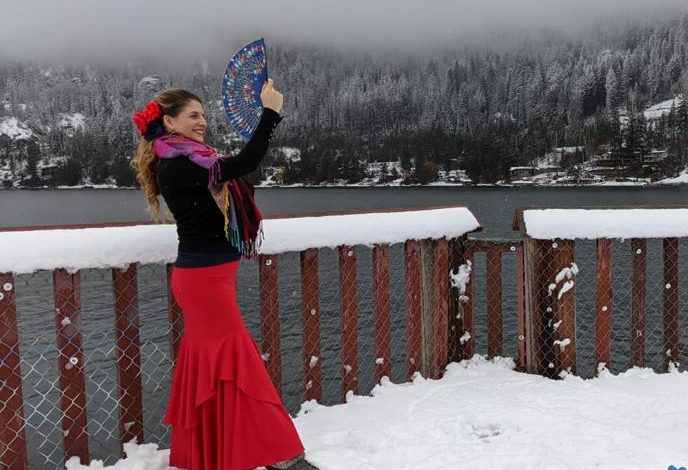
Tamar Ilana, as she’s professionally known, visited the region every summer growing up, with her mother, ethnomusicologist Judith Cohen, who immersed her in folk music traditions including Ladino and Sephardic songs. Now she’s the vocalist at the front of Toronto’s Jaffa Road, a Jewish/Middle Eastern fusion band, and leads Ventanas, her Mediterranean and world music project, in which she incorporates flamenco into her performance and composes new music using or referencing traditional forms.
The apprehensions have been a new experience within a musical and cultural world that was part of Tamar Ilana’s travels and upbringing.
“My whole life, it’s always been in the background. But I had never felt it myself until I was in Turkey. All the Jewish schools closed, Jews stayed home, Jews hid, and we hid our concert.”
During concerts in Spain after Oct. 7, she felt pressure to make statements related to the war, and decided to acknowledge the possibilities for coexistence that her music demonstrates, by closing out Ventanas shows with a Moroccan Sephardic number, or, with Jaffa Road, a tune in Hebrew and Arabic.
“This is music of the Sephardic Jews, Morocco, Arabic, Hebrew… an example of peace and how people can live together,” she’ll say.
But even absent political statements, audience members disrupted Jaffa Road’s performance six months ago at the 2024 Hillside Festival in Guelph, Ont., by yelling from beside the outdoor stage.
The band had to stop the show and she addressed the protesters.
“This isn’t how you do things. You do things through conversation,” she recalls saying.
“I was trembling… it was pretty crazy.”
Tamar Ilana was also targeted with a threatening Instagram message ahead of a live show she was producing, earlier in 2024.
“I was throwing an event for Indigenous women… We got these messages about turning it into a Palestinian fundraiser ‘or else,’ basically.” She called security. (Tamar Ilana has Cree-Salteaux ancestry from her father Robert Adams, who’s a poet and photographer.)
“This is without me saying anything at all, all year, so I can’t imagine [where the threat originated]… This is from people reading my bio and seeing I’m Jewish, is the only thing I can gather.”
Tamar Ilana, who recently released Ventanas’ latest album, says she’s feeling a shift toward “looking inwards” that Jewish friends and colleagues in particular have observed.
“Friends sort of emerged who happen to be Jewish… suddenly we were looking for solidarity in each other, and just to be in a room where we felt safe and where we felt surrounded by people who understood us.
“We heard our whole lives about Jewish history, and I’ve always felt like it was like an extended Jewish family. It’s almost… the family coming together now, when we need each other—even people who you don’t know that well, but there seems to be this cord,” she said. “It’s comforting, but it’s also a little scary that we need it.”
Aaron Lightstone, the Jaffa Road bandleader and oud player, said they were performing music based on poetry by Israel ben Moses Najara, a 15th century rabbi who lived in Gaza, Safed and Damascus, when demonstrators interrupted.
“If you’re protesting Tamar and Jaffa Road, you’re either totally ignorant because you have no business protesting; don’t know what you’re talking about; or totally antisemitic.”
Lightstone is rethinking music festival submissions for 2025, and wonders if it’s safer to focus on bookings at Jewish venues exclusively.
“As much fun as they are, should I be chasing Canadian jazz and folk festivals?”
It’s an odd question, Lightstone says, for a band centring “coexistence, [and] pushing Jewish music into [the] mainstream.”
Still, he says, “it doesn’t take a lot of people to be disruptive.”
A new brand of unity
Jewish Futures, an arts and culture salon held on Nov. 24, offered conversational spaces to foster a sense of Jewish unity in the arts. (The CJN was a promotional partner for its second year.)
Kultura Collective, an initiative by UJA Federation of Greater Toronto, organized the day, including a session on exploring Yiddish cultural expressions, where visual artist Jonah Strub discussed making artwork “as accessible as possible,” often through humour. His ultimate goal is “to provide representation to other queer and Jewish people.”
During a panel discussion titled “Jewish Infusions,” four artists shared how they’ve incorporated their Jewish identity into their creative practices and output.
Erez Zobary, a Toronto singer and songwriter, was releasing her new album, which explores her identity through connecting to her Yemeni Mizrahi background and her grandmother’s story of leaving Yemen for Israel via Operation Magic Carpet. Zobary received a Canada Council for the Arts grant to visit family in Israel as part of the personal project.
The new album is a departure from her previous work, where her songs “[talked] about getting dumped on a Thursday,” she said.
Making new music that’s so “outwardly Jewish,” with Hebrew and English song titles, plus Yemeni Jewish cultural elements, allowed her to see the process in a new way.
“Before I was making music about coming of age… breakups and living in the city and trying to figure out who I am,” said Zobary. “With this one, it definitely feels different.”
In the months following the Oct. 7 attacks, Zobary says, her writing process for the new album shifted.
“’I [had been] so excited to write this project and to share my identity with people… and then I just became so afraid to do it, and I think it took me months and months to get to a point again when I [felt] good to share it.”
Some panellists said they braced themselves for a negative reception that thankfully never came.
Playwright and actor Jordi Mand described an unexpectedly warm reception to her own work In Seven Days from audiences in London, Ont., where her family lives. The play unfolds as a family contends with their father opting for Medical Assistance in Dying (MAID), and includes a rabbi among the play’s five characters.
“The father goes through with ending his life … [it’s about] how we say goodbye to people we love, but it’s also about MAID in the context of Judaism.”
Thank you to everyone who joined us for Jewish Futures 2024 on Sunday! It was a beautiful afternoon of conversations, art-making and connecting as a creative community. @thethmuseum @ProssermanJCC
Photos @shaymarkowitz_ pic.twitter.com/96tIa8Si0K— Kultura Collective (@kultura_TO) November 26, 2024
Mand lives in Toronto but says she remains connected to her synagogue in London, and was apprehensive when her play was mounted in a city where the Jewish community is less prominent.
“I was absolutely terrified about sharing an unabashedly Jewish story there,” specifically, when the show’s run started last February at the Grand Theatre.
But the London response was “overwhelmingly positive,” she says.
“It really taught me a lot about where we are in place and time… [with] stories where there is such universality.”
Painter and jeweller Edith Barabash, who had been working as a lawyer in Victoria, B.C., started making and selling art out of a camper van two years ago. While there wasn’t much Jewish content at first, she now makes earrings of challah, babka, and matzah, and paints shofar-blowing scenes.
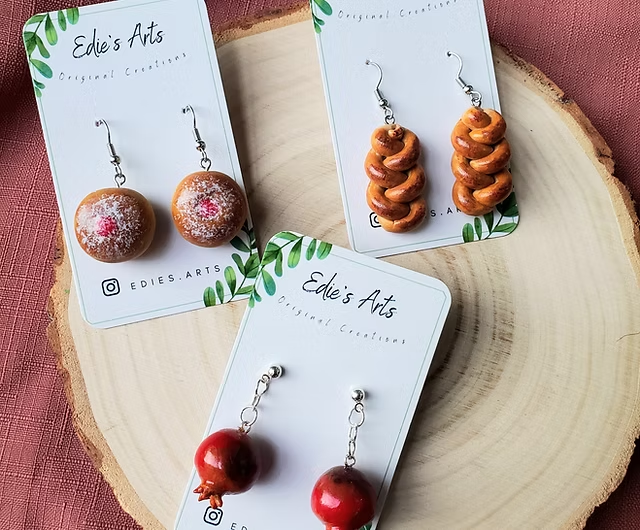
She lost online followers after releasing work with Jewish symbols.
“People who didn’t resonate with that, just unfollowed me immediately as soon as I started posting anything related to Judaism, Israel… a lot of the following that I built up until then was gone. And then a new following came.”
Barabash says she now feels called to bring community connections to her work—and now, she tends to stick to Jewish markets. She agrees “we’re becoming more insular.”
She also finds beauty in Jewish artists leaning into Jewish culture.
“When the world is more ready to hear those stories and see that art, we’re going to be so much stronger as a community, and our stories are going to be stronger.”
Josh Saltzman, a screenwriter whose recent short film is a horror set at a shivah, said he encounters antisemitism constantly in his industry, including social media posts from his crew members. It has led him to prepare for potential disruptions at film festival screenings.
When asked later if the antisemitism has worsened, Saltzman wrote in response: “I do believe it’s been worse since Oct. 7. Although I can’t say if antisemitism is spreading or people are just emboldened to be louder about it.”
However, he remains unapologetic about making space for Jewish culture.
“Every culture should get to share their stories… if people are going to unfollow any of us, any artists … their loss. Let them unfollow.”
While antisemitism is probably making Jewish artists more insular, that shouldn’t silence them, he says.
“I don’t want to let that stop me from making Jewish stories, because some people hate Jews. That’s the history of the world. So keep making art.”
Saltzman’s uplifting tone closed out the panel with a call for collective support.
“I feel like more than ever, I want to be more provocative with my work… I encourage any of you that are artists or have anything to say or even just how you live your life to spread [your] wings more,” said Saltzman.
“I am scared to do it, but I’m trying to and I want to… I feel like if I see other people spreading their wings, I’m more encouraged to do it as well,” he said, to a room of nodding respondents.
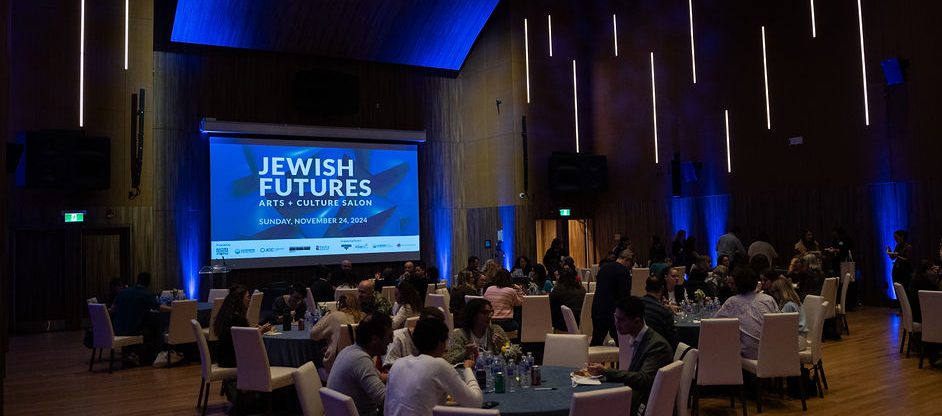
In the concluding conversation at the salon, Indigenous and Jewish actor and director Jennifer Podemski called stories her bridge-building effort, including Little Bird, the TV series she co-created about a First Nations woman adopted by a Jewish family during Canada’s Sixties Scoop, who tries to reconnect with her birth family and heritage.
“I am fascinated and dedicated to sparking humanity through story… that sparks something in someone else that they connect to, that creates a bridge,” said Podemski. “And in that bridge, you can build a conversation and from that conversation, you can have a dialogue.
“As much as I really didn’t like or enjoy being Native and Jewish pretty much most of my life… I realized that it was on purpose that I was this thing at this time and doing this work… to find humanity in some way, and tell the stories that can connect people.”
Now more than ever, she said, Jewish expressions may be sparking difficult conversations.
“Nobody cared about it before. Right now people care about [Jewish identity] because they don’t like it, and they don’t want you to exercise your Jewishness anymore… so I want to exercise it more.”
Pride in the face of prejudice
Sam Mogelonsky is director of Arts, Culture and Heritage at UJA Federation of Greater Toronto and runs Kultura Collective, which has now produced two Jewish Futures conferences since Oct. 7.
“Everyone’s approaching this moment differently,” said Mogelonsky.
Pride in being Jewish might look different for each person: Self-identifying in a website bio, for instance, as a Jewish Canadian or Israeli Canadian artist, “where maybe that word Jewish wasn’t there before,” said Mogelonsky, although she notes “some people have taken that wording out of their bios.”
Graphic artist Miriam Libicki has been banned by Vancouver Comics Arts Festival due to her past service in the IDF https://t.co/pJpK5tYTc7 h/t @JesseBrown
— The Canadian Jewish News (@TheCJN) May 29, 2024
There’s a sense of seeking out “like-minded creatives,” she says, which runs parallel with fears about “how you are going to be perceived by the wider community… that potentially, doors might close on you if you are outward with that identity.”
It’s both a complicated moment, and a sad one, says Mogelonsky, with fears about additional security needs, or perceptions that venues aren’t interested in Jewish cultural content.
“There’s many reasons why people may not want to be as open about their connections to being Jewish,” she said. “At the same time that we’re finding so much pride and joy in sharing these Jewish stories… we’re also finding moments of complication around that.”
Jewish Futures, she hopes, offered inspiration, helped grow connections, or simply allowed artists to hear “that other people are feeling the same way that you are.”
Mogelonsky developed the cultural salon concept following discussions she and UJA colleagues were having with artists during a previous event series called Art Schmooze, where informal gatherings—usually held at art galleries—brought artists together over wine and cheese.
Now, in some pockets of Toronto, gallery events are helping Jewish artists forge new connections outside the fraught, one-sided alignment of many left-leaning elements of independent arts communities.
Gillian Lahav and Zack Rosen were booking a show at a Dundas Street West gallery when the venue declined to host a Jewish-themed show. The painter friends instead ran a cat-themed exhibition, and invited friends for an Art Shabbat evening on a Friday in November. (The gallery says it’s open to hosting more Shabbat events.)
“It’s kind of difficult to find homes for Jewish work right now,” said Rosen. “There’s a sense in the broader world that to engage with Jewish work right now is unsafe for the venue holding it.”
He says the explicitly Jewish gathering provided an important—if also informal—Jewish community space.
“The scariness… some of the heaviness of the world around us now has brought us together,” says Rosen. “And that’s not a terrible thing.”
Lahav says Jewish artists have experienced a level of fear around how they will be received in such spaces.
“[People] are very quick to jump to one side of a binary that we know is nuanced but unfortunately the broader art world forgets is nuanced,” she said.
“When [they] go out of their way to assert which side [of the] boundary they land on,” that can alienate Jewish community members.
“At the same time, it’s an opportunity to see where we are welcome.” Community-based art galleries are where she feels “everyone knows they can have a home.”
Art Shabbat was a way to gather without “the weight we carry around all week.”
Petrina Blander launched her photo exhibition at the She Said Gallery, housed inside a laundromat at 384 Roncesvalles Ave., with a Friday night candle-lighting and challah blessings.
Shabbat Shalom Toronto, which continues to Jan. 8, is not an explicitly Jewish-themed exhibition, she says, although some of the images relate to Judaism, and Blander’s artist bio references her Israeli background.
But the photos were secondary to the gathering itself, according to Blander.
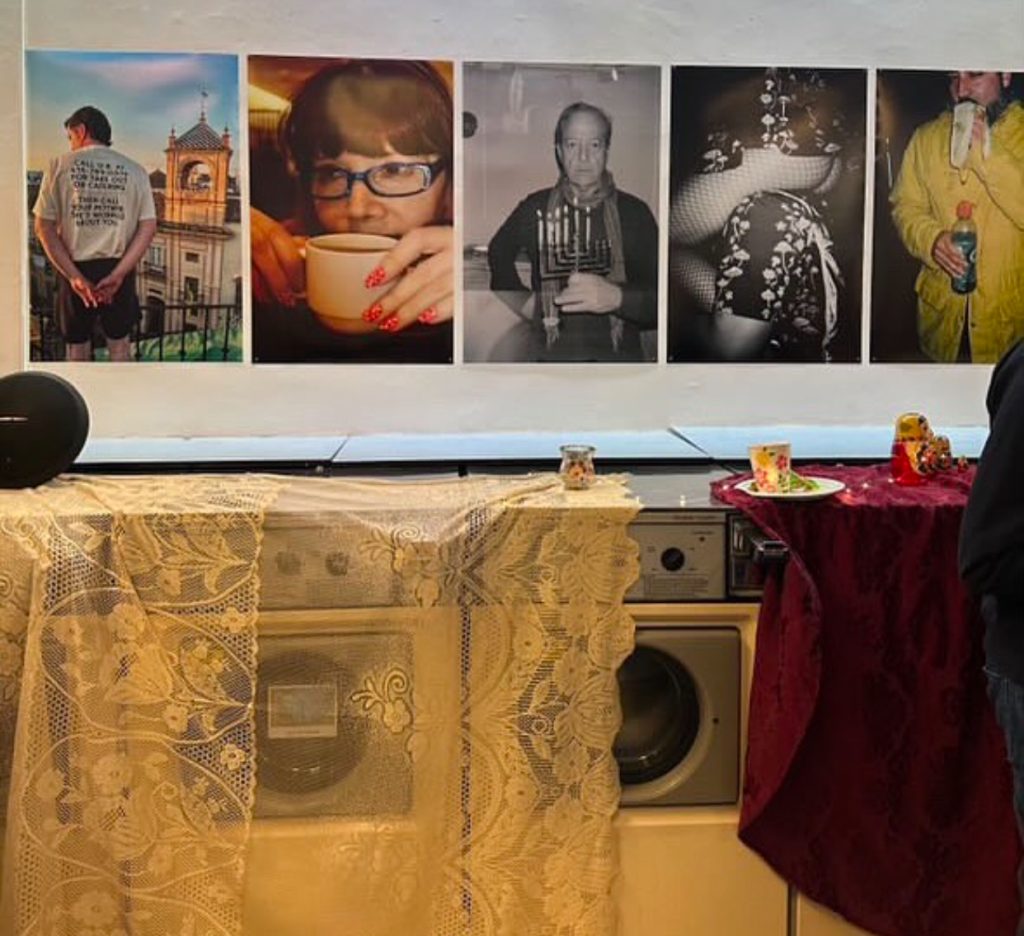
“The primary purpose was to bring people together… a safe space to break bread and connect.”
It’s a community where a nearby viaduct had been spray-painted “Fuck Zionists” in huge letters in the weeks after Oct. 7, as Israel’s military attacked Hamas in Gaza.
Blander says she isn’t religious, but found resonance in the idea expressed via the Netflix show Jewish Matchmaking, about how “‘there’s 15 million Jews and there’s 15 million different ways of being Jewish.’”
“I can’t tell you what part of this is Jewish [to me], because to me it doesn’t really matter… we all connect to it in a different way,” she said.
“There was prosciutto on the table… and two ginormous challahs, and they were blessed.”
Blander’s co-organizer Elise Kayfetz, who’s also the thrifting proprietor behind Vintage Shmatta, said Shabbat Shalom Toronto brought together “all walks of life, from Israel to down the street.”
“I haven’t been in a room with this many Jews since my bat mitzvah,” she said at the gathering.
Blander leaned over to Kayfetz: “This is my version of a shtetl in the heart of Toronto.”
The post Jewish artists in Canada turned inward during 2024—and discovered bolder identities to share for 2025 appeared first on The Canadian Jewish News.
RSS
After False Dawns, Gazans Hope Trump Will Force End to Two-Year-Old War

Palestinians walk past a residential building destroyed in previous Israeli strikes, after Hamas agreed to release hostages and accept some other terms in a US plan to end the war, in Nuseirat, central Gaza Strip October 4, 2025. Photo: REUTERS/Mahmoud Issa
Exhausted Palestinians in Gaza clung to hopes on Saturday that US President Donald Trump would keep up pressure on Israel to end a two-year-old war that has killed tens of thousands and displaced the entire population of more than two million.
Hamas’ declaration that it was ready to hand over hostages and accept some terms of Trump’s plan to end the conflict while calling for more talks on several key issues was greeted with relief in the enclave, where most homes are now in ruins.
“It’s happy news, it saves those who are still alive,” said 32-year-old Saoud Qarneyta, reacting to Hamas’ response and Trump’s intervention. “This is enough. Houses have been damaged, everything has been damaged, what is left? Nothing.”
GAZAN RESIDENT HOPES ‘WE WILL BE DONE WITH WARS’
Ismail Zayda, 40, a father of three, displaced from a suburb in northern Gaza City where Israel launched a full-scale ground operation last month, said: “We want President Trump to keep pushing for an end to the war, if this chance is lost, it means that Gaza City will be destroyed by Israel and we might not survive.
“Enough, two years of bombardment, death and starvation. Enough,” he told Reuters on a social media chat.
“God willing this will be the last war. We will hopefully be done with the wars,” said 59-year-old Ali Ahmad, speaking in one of the tented camps where most Palestinians now live.
“We urge all sides not to backtrack. Every day of delay costs lives in Gaza, it is not just time wasted, lives get wasted too,” said Tamer Al-Burai, a Gaza City businessman displaced with members of his family in central Gaza Strip.
After two previous ceasefires — one near the start of the war and another earlier this year — lasted only a few weeks, he said; “I am very optimistic this time, maybe Trump’s seeking to be remembered as a man of peace, will bring us real peace this time.”
RESIDENT WORRIES THAT NETANYAHU WILL ‘SABOTAGE’ DEAL
Some voiced hopes of returning to their homes, but the Israeli military issued a fresh warning to Gazans on Saturday to stay out of Gaza City, describing it as a “dangerous combat zone.”
Gazans have faced previous false dawns during the past two years, when Trump and others declared at several points during on-off negotiations between Hamas, Israel and Arab and US mediators that a deal was close, only for war to rage on.
“Will it happen? Can we trust Trump? Maybe we trust Trump, but will Netanyahu abide this time? He has always sabotaged everything and continued the war. I hope he ends it now,” said Aya, 31, who was displaced with her family to Deir Al-Balah in the central Gaza Strip.
She added: “Maybe there is a chance the war ends at October 7, two years after it began.”
RSS
Mass Rally in Rome on Fourth Day of Italy’s Pro-Palestinian Protests

A Pro-Palestinian demonstrator waves a Palestinian flag during a national protest for Gaza in Rome, Italy, October 4, 2025. Photo: REUTERS/Claudia Greco
Large crowds assembled in central Rome on Saturday for the fourth straight day of protests in Italy since Israel intercepted an international flotilla trying to deliver aid to Gaza, and detained its activists.
People holding banners and Palestinian flags, chanting “Free Palestine” and other slogans, filed past the Colosseum, taking part in a march that organizers hoped would attract at least 1 million people.
“I’m here with a lot of other friends because I think it is important for us all to mobilize individually,” Francesco Galtieri, a 65-year-old musician from Rome, said. “If we don’t all mobilize, then nothing will change.”
Since Israel started blocking the flotilla late on Wednesday, protests have sprung up across Europe and in other parts of the world, but in Italy they have been a daily occurrence, in multiple cities.
On Friday, unions called a general strike in support of the flotilla, with demonstrations across the country that attracted more than 2 million, according to organizers. The interior ministry estimated attendance at around 400,000.
Italy’s right-wing government has been critical of the protests, with Prime Minister Giorgia Meloni suggesting that people would skip work for Gaza just as an excuse for a longer weekend break.
On Saturday, Meloni blamed protesters for insulting graffiti that appeared on a statue of the late Pope John Paul II outside Rome’s main train station, where Pro-Palestinian groups have been holding a protest picket.
“They say they are taking to the streets for peace, but then they insult the memory of a man who was a true defender and builder of peace. A shameful act committed by people blinded by ideology,” she said in a statement.
Israel launched its Gaza offensive after Hamas terrorists staged a cross border attack on October 7, 2023, killing some 1,200 people and taking 251 people hostage.
RSS
Hamas Says It Agrees to Release All Israeli Hostages Under Trump Gaza Plan

Smoke rises during an Israeli military operation in Gaza City, as seen from the central Gaza Strip, October 2, 2025. Photo: REUTERS/Dawoud Abu Alkas
Hamas said on Friday it had agreed to release all Israeli hostages, alive or dead, under the terms of US President Donald Trump’s Gaza proposal, and signaled readiness to immediately enter mediated negotiations to discuss the details.


